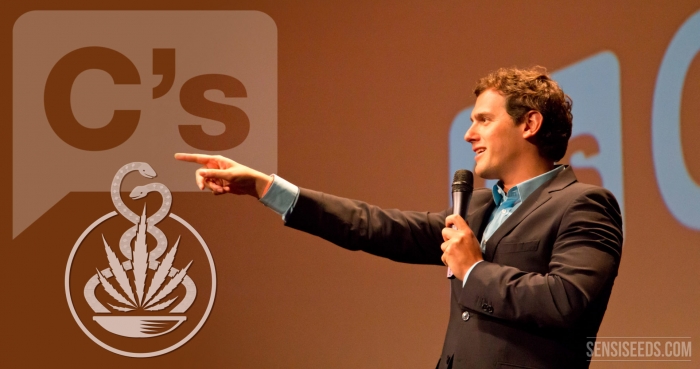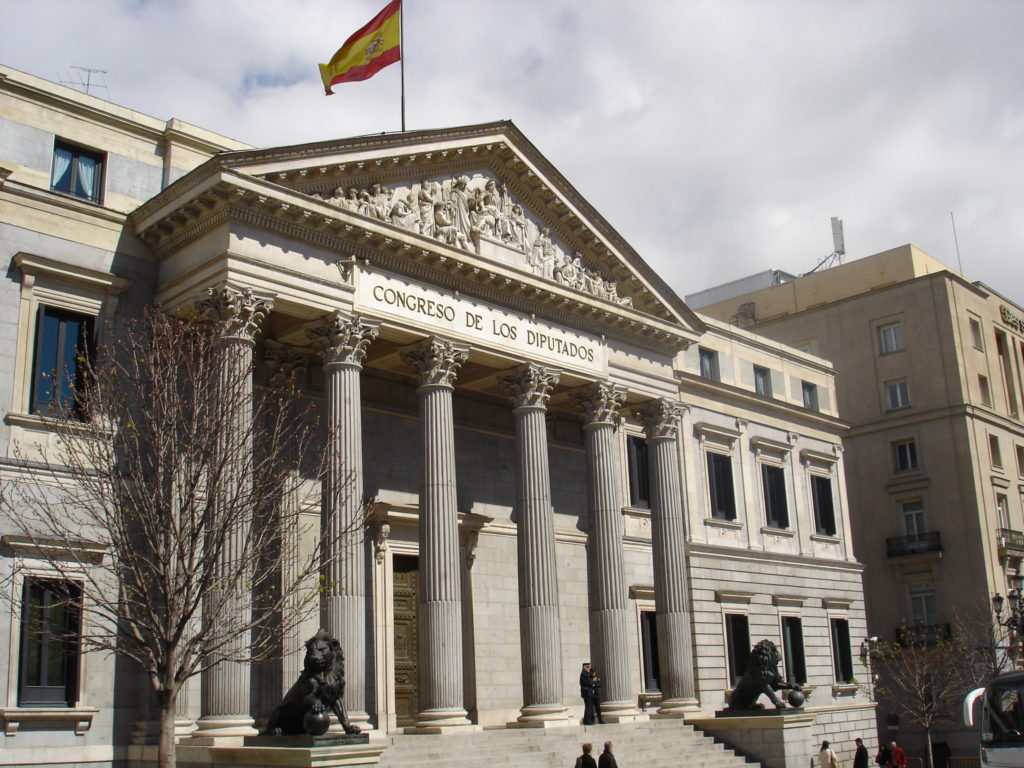You are here
Home 🌿 Medical Cannabis News 🌿 Ciudadanos and the OECM Request Regulation of Medical Cannabis in Spain 🌿Ciudadanos and the OECM Request Regulation of Medical Cannabis in Spain

In February 2017, Ciudadanos and the OECM presented a Non-Legislative Motion in Congress in order to regulate medical cannabis in Spain. Its objective is to address the needs and demands of Spanish patients, as well as to open a parliamentary debate about therapeutic cannabis – a treatment backed by scientific evidence.
Last February, the parliamentary group Ciudadanos, along with representatives from the Observatorio Español de Cannabis Medicinal, presented a Non-Legislative Motion (NLM) to the Spanish Congress in order to regulate medical cannabis. The objective of this initiative is to address the needs and demands of Spanish patients, as well as to open the debate about therapeutic cannabis in the Spanish Congress. The orange formation insists that this is a treatment backed by approved scientific research and that its effectiveness has been demonstrated in many other countries.
On February 20 2017, the spokesperson for Health Matters in Congress from the parliamentary group Ciudadanos, Francisco Igea Arisqueta, presented to the media the Non-Legislative Motion to regulate the medical use of cannabis products that had been registered earlier in the Spanish Congress.
In this meeting, which we hope will be a historical one, Igea was accompanied by Carola Pérez and Professor Manuel Guzmán – president and vice-president, respectively, of the Observatorio Español de Cannabis Medicinal, an organization that has promoted the proposal.
The initiative has been presented through The Health and Social Affairs Committee, because it is deemed to be an “urgent and evident” matter. As Francisco Igea explained, “the medical use of Cannabis helps in dealing with pain, which sometimes can be unbearable”, and this is “backed by scientific research”.
The NLM was presented in Congress by Ciudadanos and the OECM
Spaniards Also Have the Right to Use Medical Cannabis
Many countries across the world have already implemented medical cannabis programs – USA, Canada, Israel, Uruguay, The Netherlands, Italy or Germany, among many others – which have demonstrated how effective and beneficial cannabis is for patients suffering from a myriad of illnesses and disorders. Igea wanted to highlight that medical cannabis “is nothing short of being another medical treatment to which Spanish citizens should have access”.
The proposal explains that “there is a multitude of patients who, advised even by professionals, find in cannabis the means to mitigate the signs and symptoms produced by their illness”, it also discusses its use as a substitute for other substances to treat possible addictions (as is the case with morphine addiction).
In their exposition of the reasons that motivated their proposal, Ciudadanos summarizes quite well how cannabis, from being medicine used in antiquity was “removed from the list of pharmaceutical choices in the middle of the 20th century on account of an incorrect application of the international drug control system planned in the international treaties of the United Nations, to which the so-called War Against Drugs was later added”.
The deputy and spokesman from Ciudadanos, who is a practicing doctor, also explained that cannabis has been demonstrated to have important beneficial effects in the prevention of nausea and vomiting caused by a number of treatments such as chemotherapy. Likewise, “it is also a potent appetite stimulant” that can be applied as treatment in a number of pathologies, such as AIDS or different types of cancer, in addition to improve neuropathic pain and spasticity in illnesses such as multiple sclerosis (MS).
The list of illnesses for which cannabis has been proven to be beneficial is very long, and it is now time that Spanish patients be able to improve their quality of life by using it legally and through the creation of a specific program of medical cannabis.
The Proposal Refers to Cases Already Taking Place in Other Countries
What the Non-Legislative Motion is asking the Government is that it “regulates and facilitates access to treatments with cannabis and its derivatives, under strict medical instruction and supervision, for pathologies in which its effectiveness had been demonstrated or the physician sees its use convenient”.
Ciudadanos believes that cultivation, sale, and consumption of cannabis with therapeutic ends should be regulated in Spain because there is “a reality that no one can deny”. The formation takes it further by asking for regulation of “controlled” cannabis cultivation provided it is only used with medical purposes and “with the necessary quality standards, traceability, and security”.
What is being discussed is the creation of “controlled points of sale of medical cannabis, as well as to delimit logistic networks with the necessary security to prevent abuse or illegal use”, in addition to implementing “an assessment system of the impact in public health, particularly, of the quality of life of the patients treated with medical cannabis”.

The regulation of “controlled” cannabis cultivation with medical ends is demanded
- (CC. Rafael Ramos)
The orange political formation has asked for the exploration and contemplation of medical cannabis as an alternative treatment that contributes a variety of benefits, in addition to being less expensive compared to the few options derived from cannabis that are presently available commercially in Spain, such as Marinol, Cesamet or Sativex.
The president of the Observatorio Español de Cannabis Medicinal, Carola Pérez, who was present during the registration of the proposal, spoke about the “situation of legal and sanitary uncertainty” for patients who need cannabis as a medical treatment in Spain.
It is Not the First Non-Legislative Motion of this Kind
Even though many believe that this is the first time a proposal of this kind occurs in Spain, there have been others before, which resemble it very much. Last December, Esquerra Republicana de Cataluña (ERC) presented for the second time to the Spanish Congress a Non-Legislative Motion to regulate cannabis in Spain. This initiative proposed the legalization of cannabis cultivation, possession, and consumption, in addition to the revision of sanctions applied to different cannabis associations.
In this occasion, the proposal by Ciudadanos in conjunction with the Observatorio Español de Cannabis Medicinal, from which the proposal originated, focuses in providing legal cover to patients who decide to use cannabis as treatment.
According to Manual Guzmán, Professor of Biochemistry and Molecular Biology of the University Complutense of Madrid and vice-president of OECM, “we hope that health concerns are more important than political differences. We have spoken to all the parties (we still miss the PSOE) and they have all agreed, with the exception of the PP, which takes no position, but which we expect will join the initiative”.
“The core points are to facilitate access to medical cannabis therapies for all patients who need it, to legalize cannabis cultivation, whether it is executed by businesses, patients, or the State, to regulate the sale process and distribution of cannabis, whether in hospital pharmacies or specific places, and last, to create an organization to make a follow-up of the impact this measure may have in public health” explained Guzmán.
President Carola Pérez expressed that as “patients we have the right to the best possible treatment”, in addition to expressing her desire to “open the debate”, and “to be able to be heard” in Congress. “This way, with the evidence at hand, we hope that cannabis can be regulated as medicine”.
What Exactly is a Non-Legislative Motion and What is it Good for?
A Non-Legislative Motion is a parliamentary route used by deputies in the Courts, among other things, in order to request or urge the Government to execute a concrete action. This means that in and of itself this is a formula that does not have an immediate legal effect – because it does not bind the Government to act – but it serves to open debates in the Courts and in Spanish society.
With the proposal put forth by C’s and the OECM, the debate about medical cannabis for Spanish patients has finally begun and it has entered Congress this session – we hope for good.
The Observatorio Medicinal has announced that it will continue to hold meetings with the rest of the political parties in order to have them join the debate. According to spokesman, Igea, it is expected that the proposal will prosper in Congress with the support of the rest of the parliamentary groups, of the Government and the Department of Health.
Once the proposal is presented, Ciudadanos expects that it be debated in Congress in plenary session, in the Committee of Health in Congress and in the Joint Committee for the Study of Drugs. The orange formation has requested the appearance in Congress of three experts so that they can provide their views regarding the matter as well as to explain the scientific evidence concerning the use of cannabis with therapeutic ends.
The experts required to appear are two Biochemistry and Molecular Biology professors, Manuel Guzmán Pastor – co-director of the research group in cannabinoids of the University Complutense of Madrid – and José Antonio Ramos Atance – the person in charge of explaining “the indications and contra-indications of cannabis use with therapeutic purposes”.
Finally, the third expert to appear before the Committee of Health will be the president of the Observatorio de Cannabis Medicinal, Carola Pérez, “in order to explain the evidence and testimonies from patients who use cannabis as a therapeutic tool due to ineffectiveness of other existent treatments”, so reads the request of appearance.
Parliamentary Predisposition to Debate Regulation
So far it appears that no group in Congress has categorically refused the initiative presented by Ciudadanos and the OECM in order to regulate medical cannabis in Spain – not even the Popular party, which has been known for strongly opposing medical cannabis regularization.
Initial reactions from politicians of different parliamentary groups have already started to emerge. Of course, it is not surprising that the ERC and Unidos Podemos have welcomed the proposal. Both political formations are in favour of legalization and regulation of cannabis for recreational or medical purposes.
On the other hand, it seems that more traditional parties such as the PNV, the PSOE and the PP, have found it difficult to take a more defined stand for the moment. Within the ranks of the PSOE, somewhat shy voices have started to be heard, even though the overall line of thought continues to be ambiguous: recently, a spokeswoman on health from the PSOE said that it is “possible that there can be a medical application (of cannabis)”. – let’s hope that the experts required to appear before the committee succeed in making her understand that it is not just a possibility, nowadays medical cannabis is a fact.
There is no doubt that the most important reaction came from the Popular party, the governing party and the main obstacle against which all previous cannabis legalization proposals have clashed. However, it seems that on this occasion the party has announced that until now it does not have “a defined view concerning the subject”. – for the moment, less is more.

The parliamentary debate about therapeutic cannabis must start right now in Congress
- (CC. Pedro Pablo)
“A reality that cannot be avoided”
Something is certainly changing, even within the PP there are sectors that want to change the discourse around cannabis and some of its members speak openly in favour of legalization – as is the case with Eduardo Van den Eynde, and the well-known Esperanza Aguirre.
Even though the proposal is expected to succeed, if it does not, Igea said, his party would consider presenting a complete bill.
Looking the other way is never a solution. The question of medical cannabis is a reality that cannot be ignored, not even in Spain; thus let us know patients, doctors and scientists that are aware of the benefits of cannabis, demonstrated in many medical programs implemented all over the world.
This Non-Legislative Motion is a great opportunity for Spanish rulers to open a pressing debate. One that should soon lead to the implementation of a just and clear regulatory system that addresses the long-ignored social realities of Spain, and that is not open to interpretation.
420 Intel is Your Source for Marijuana News
420 Intel Canada is your leading news source for the Canadian cannabis industry. Get the latest updates on Canadian cannabis stocks and developments on how Canada continues to be a major player in the worldwide recreational and medical cannabis industry.
420 Intel Canada is the Canadian Industry news outlet that will keep you updated on how these Canadian developments in recreational and medical marijuana will impact the country and the world. Our commitment is to bring you the most important cannabis news stories from across Canada every day of the week.
Marijuana industry news is a constant endeavor with new developments each day. For marijuana news across the True North, 420 Intel Canada promises to bring you quality, Canadian, cannabis industry news.
You can get 420 Intel news delivered directly to your inbox by signing up for our daily marijuana news, ensuring you’re always kept up to date on the ever-changing cannabis industry. To stay even better informed about marijuana legalization news follow us on Twitter, Facebook and LinkedIn.




